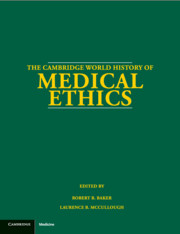Book contents
- Frontmatter
- PART I AN INTRODUCTION TO THE HISTORY OF MEDICAL ETHICS
- PART II A CHRONOLOGY OF MEDICAL ETHICS
- PART III DISCOURSES OF MEDICAL ETHICS THROUGH THE LIFE CYCLE
- PART IV THE DISCOURSES OF RELIGION ON MEDICAL ETHICS
- PART V THE DISCOURSES OF PHILOSOPHY ON MEDICAL ETHICS
- PART VI THE DISCOURSES OF PRACTITIONERS ON MEDICAL ETHICS
- PART VII THE DISCOURSES OF BIOETHICS
- PART VIII DISCOURSES ON MEDICAL ETHICS AND SOCIETY
- Ethical and Legal Regulation of Medical Practice and Research
- 46 The Medical Market place, the Patient, and the Absence of Medical Ethics in Early Modern Europe and North America
- 47 The Legal and Quasilegal Regulation of Practitioners and Practice in the United States
- 48 The Ethics of Experimenting on Animal Subjects
- 49 The Ethics of Experimenting on Human Subjects
- 50 The Historical Development of International Codes of Ethics for Human Subjects Research
- 51 International Ethics of Human Subjects Research in the Late Twentieth Century
- B Medical Ethics, Imperialism, and the Nation-State
- C Medical Ethics and Health Policy
- Appendix: Biographies: Who Was Who in the History of Medical Ethics
- Bibliography
- Index
47 - The Legal and Quasilegal Regulation of Practitioners and Practice in the United States
from Ethical and Legal Regulation of Medical Practice and Research
Published online by Cambridge University Press: 28 May 2012
- Frontmatter
- PART I AN INTRODUCTION TO THE HISTORY OF MEDICAL ETHICS
- PART II A CHRONOLOGY OF MEDICAL ETHICS
- PART III DISCOURSES OF MEDICAL ETHICS THROUGH THE LIFE CYCLE
- PART IV THE DISCOURSES OF RELIGION ON MEDICAL ETHICS
- PART V THE DISCOURSES OF PHILOSOPHY ON MEDICAL ETHICS
- PART VI THE DISCOURSES OF PRACTITIONERS ON MEDICAL ETHICS
- PART VII THE DISCOURSES OF BIOETHICS
- PART VIII DISCOURSES ON MEDICAL ETHICS AND SOCIETY
- Ethical and Legal Regulation of Medical Practice and Research
- 46 The Medical Market place, the Patient, and the Absence of Medical Ethics in Early Modern Europe and North America
- 47 The Legal and Quasilegal Regulation of Practitioners and Practice in the United States
- 48 The Ethics of Experimenting on Animal Subjects
- 49 The Ethics of Experimenting on Human Subjects
- 50 The Historical Development of International Codes of Ethics for Human Subjects Research
- 51 International Ethics of Human Subjects Research in the Late Twentieth Century
- B Medical Ethics, Imperialism, and the Nation-State
- C Medical Ethics and Health Policy
- Appendix: Biographies: Who Was Who in the History of Medical Ethics
- Bibliography
- Index
Summary
INTRODUCTION
The quality of medical care is regulated in a number of different ways. Some forms of regulation seek to assure medical quality prospectively, by setting standards of entry into different spheres of medical practice. Some seek to assure quality retrospectively, by punishing, correcting, or weeding out practitioners who have proven themselves incompetent or unethical. Unregulated markets, of course, control for quality to some extent: on the prospective side, persons with substandard qualifications have a difficult time attracting customers in a competitive market; on the retrospective side, those who perform a service badly have a difficult time getting paid for it, and those who develop generally poor reputations are unable to hold their patients’ custom. It is now commonplace to note that the market for health care services – plagued as it is by information deficits and agency problems – is not an efficient self-regulator. Market mechanisms must therefore be augmented by law: prospectively by licensure requirements and standards governing medical training, and retrospectively by license revocation proceedings, criminal prosecutions, and private medical malpractice suits. Today's medical practitioners must not only compete for patients and payers; they must also be licensed, be graduates of schools whose curricula meet national standards, and be willing, if they err, to face the possibilities of malpractice liability, state licensing board investigation, professional discipline, and even criminal sanction.
- Type
- Chapter
- Information
- The Cambridge World History of Medical Ethics , pp. 540 - 551Publisher: Cambridge University PressPrint publication year: 2008



